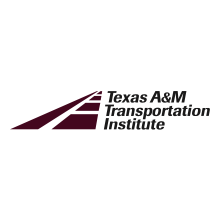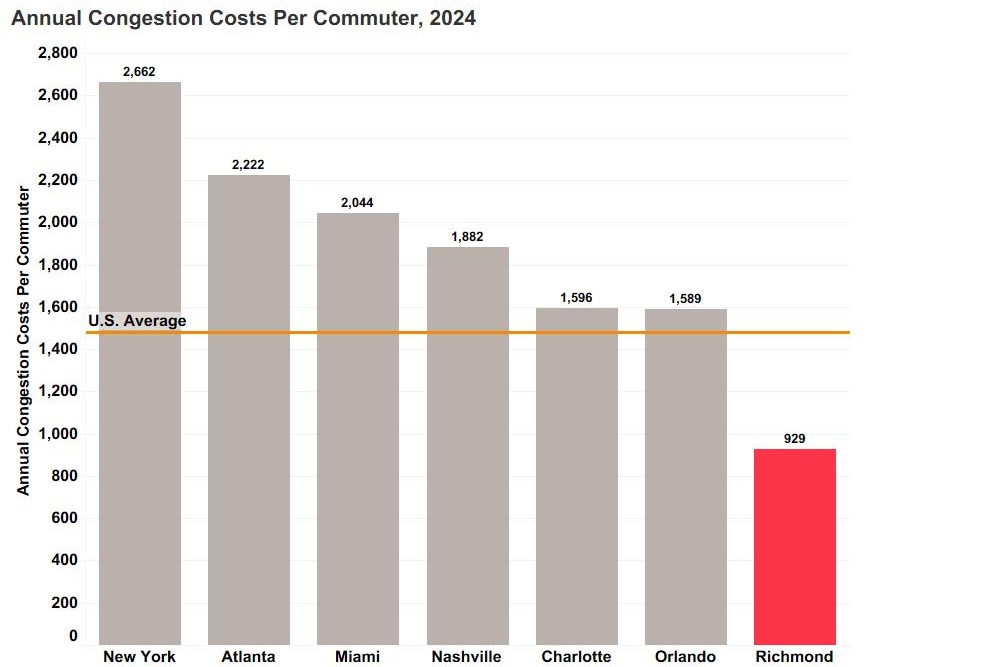
Blog
Blog | 4 min read
November 17, 2025

 The Texas A&M Transportation Institute recently released its 2025 Urban Mobility Report (UMR), which revealed that Greater Richmond maintained its multi-year standing as the nation’s least congested large urban area. The nationally-recognized study tracks congestion, commuter delays and travel patterns across 494 U.S. urban areas.
The Texas A&M Transportation Institute recently released its 2025 Urban Mobility Report (UMR), which revealed that Greater Richmond maintained its multi-year standing as the nation’s least congested large urban area. The nationally-recognized study tracks congestion, commuter delays and travel patterns across 494 U.S. urban areas.
Living in a less-congested region like Greater Richmond means less time stuck in delays on the road and less fuel wasted in traffic, which translates into lower transportation costs and more productive time for work and daily life. Compared to national averages, local commuters save $551 dollars a year in congestion costs and 21 less hours a year spent in traffic. For employers, that means a workforce with shorter and more predictable commutes that supports reliability and productivity.
Richmond is classified as a “Large Average” urban area, grouped with 32 metros of similar sizes. Among that peer set, Greater Richmond recorded the lowest annual hours of delay per commuter at 42 hours — 33 percent below the national average. It also achieved the lowest annual congestion cost per commuter at $929, or 37 percent below the national average. These findings reinforce the region’s position as one of the most commuter-friendly metros in its category, offering faster travel times and lower transportation costs for residents and businesses alike.
Washington, D.C., ranks among the most congested metro areas in the country, where the average commuter spends more than double the time in traffic each year as a driver in Richmond. That added gridlock comes with a steep price: annual congestion costs per commuter in D.C. reach $2,281, roughly 2.5 times higher than Richmond’s $929. For trucks, the difference is even more striking, with yearly congestion costs of $648 in D.C. compared to just $77 in Greater Richmond. In practical terms, distributing goods by truck from D.C. can cost nearly 9 times more in congestion-related expenses than distributing from Richmond.
D.C. is just one of several major East Coast metros that experience severe traffic congestion. Other large urban areas like New York, Atlanta, Miami, Nashville, Charlotte, and Orlando also see substantial annual delays and above-average congestion costs for commuters. The chart below compares Richmond’s annual congestion costs per commuter with those of the six metro areas listed.

Across the country, congestion has climbed back to record highs. The average commuter now spends an average of 63 hours a year stuck in traffic, nearly the equivalent of eight full workdays. In total, congestion costs Americans $269 billion annually, or about $1,480 per commuter. Trucking delays alone account for $36 billion in lost time and fuel. Notably, congestion is no longer limited to traditional rush hours; more delays occur during midday and on weekends, reflecting changing travel patterns driven by hybrid and flexible work schedules.
Richmond’s results in the 2025 Urban Mobility Report highlight a meaningful quality-of-life and business advantage for the region. Low congestion compared to other large metros means shorter commutes, lower transportation costs and greater reliability for companies that depend on moving people and goods efficiently. As national traffic levels return to record highs, Greater Richmond stands out as a metro where infrastructure keeps pace with growth as well as a place where both residents and employers reap the benefits. For businesses seeking a location that supports productivity, logistics performance and workforce satisfaction, Richmond’s transportation network continues to be a clear competitive edge.